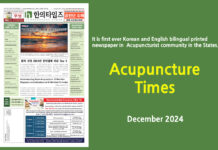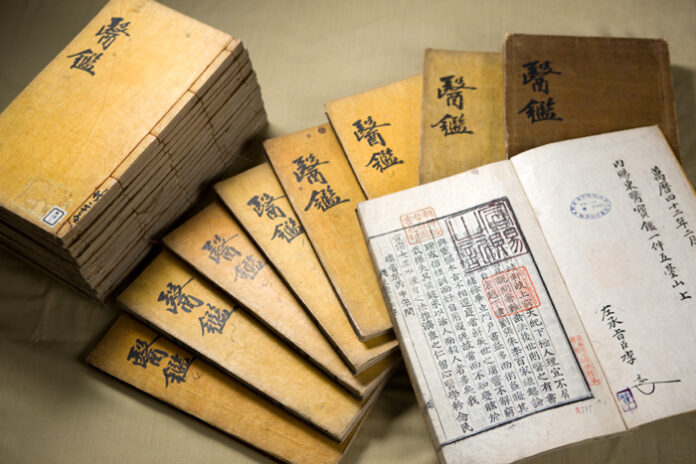Written By Jun Heo(許浚, 1539~1615), Translated by Namil Kim, Wung Seok Cha et al., Published by Ministry of Health & Welfare (Korea)
01 The Lungs Control the Voice and Produce Speech 肺主聲爲言 폐가 소리를 주관하여 말을 한다
① In the Classic of Difficult Issues (難經), it is said, “The lung controls the voice. When the lung pathogen enters the liver, the patient screams; when it enters the heart, the patient speaks; when it enters the spleen, the patient sings; when it enters the kidneys, the patient moans; when it enters the lungs, the patient wails.”
② Moreover, “When the lung pathogen enters the heart, the patient talks in delirium and speaks carelessly.”
02 Speech in Delirium 言語譫妄 섬어, 망언
① To speak to oneself is called ‘Eon (言)’, to respond to others is called ‘Eo (語)’.
② In the Annotation of the Inner Classic (內經), it is said “‘Seom (譫)’ means to speak in disorder.”
③ Delirium means to speak carelessly. The patient speaks to oneself about everyday life or widely opens the eyes and talks about things that others haven’t seen and heard. One also mutters to oneself, talks in one’s sleep, continues to moan, and yells and swears when the case is severe. All these symptoms are called delirium. This is because stomach heat suppresses the heart. [This is mentioned in detail in the chapter on Cold].
④ Someone asked, “When pathogenic qi enters the yang brightness, it is said that the patient talks in delirium and speaks carelessly. Do these really come from yang brightness?” Someone answered, “In the early stages of Cold Damage, pathogenic qi enters the skin and hair, and these come from the lungs. The lungs control sound. If the lung pathogen enters the heart, it
produces talking.” Closing the eyes and talking about things that normally happen is called delirium. Opening the eyes widely and talking about things that others haven’t seen and heard is called raving.
⑤ Delirium means to talk incoherently. It is caused by excessive pathogenic qi.
⑥ Being dressed improperly and speaking badly to everybody results from a troubled bright spirit. This is manic psychosis.
⑦ Crying sadly, moaning, talking in delirium, and speaking carelessly are all symptoms of mental derangement.
03 Being Dumb and Not Being Able to Speak 瘖不得語 벙어리가 되어 말을 하지 못하는 것
① In the Inner Classic (內經), it is said, “When pathogenic qi enters the yin aspect and attacks, the patient becomes dumb.” There are two different kinds of aphasia: flaccid tongue and larynx. [This is mentioned in detail in the chapter on Voice].
② There are several causes for dumbness: rigidity of the tongue, loss of consciousness, and clenched teeth; a drooped tongue or paralyzed tongue cause slow speech. When treating these symptoms, remove the phlegm and wind, ease the spirit or nourish qi and blood. Treatment methods should be chosen properly.
③ In the case of a deficiency and detriment of qi and blood, kidney deficiency, and when an old person suddenly cannot speak, use an All Inclusive Greatly Tonify Decoction. [The prescription is mentioned in the chapter on Deficiency Vexation]. With Cinnamomi Cortex Spissus (肉桂) removed and Acori Gramineri Rhizoma (石菖蒲) and Polygalae Radix (遠志) added.
04 Blocked Phlegm and Blood Collapse Induce Dumbness 痰塞亡血亦爲瘖 담으로 막히거나 망혈이 되어도 말을 하지 못한다
① The kidney meridian passes by the root of the tongue, the spleen meridian is connected to the root of the tongue, and the meridian that diverges from the heart meridian is connected to the root of the tongue. When these three meridians are deficient, phlegm and drool take advantage of this deficiency and block the way of the meridians. Therefore, the tongue cannot be moved and the patient cannot speak. When there is blood collapse in these three meridians, they cannot send blood to the tongue so the patient cannot speak. In the Inner Classic (內經) it is said, “When needling on the kidney meridian, if the doctor makes it bleed repeatedly, the patient becomes deficient and the tongue is unable to receive blood so one becomes dumb.” Also, it is said, “If you needle sublingual vessels too deeply, the bleeding does not stop and the patient becomes dumb.” Therefore, blood must be tonified. Moreover, if wind-heat enters these three meridians, the tongue meridians droop and the patient becomes dumb; if wind-cold invades, the tongue meridians contract and the patient becomes dumb. Use treatment methods accordingly.
② When the patient cannot speak because of an obstruction from phlegm, add Acori Gramineri Rhizoma (石菖蒲), leaf of Phyllostachys bambusoides S. et Z. (竹茹), Ginseng Radix (人蔘) or Scutellariae Radix (黃芩), and Coptidis Rhizoma (黃連) to a Guide Out Phlegm Decoction. [The prescription is mentioned in the chapter on Phlegm]. When the patient cannot speak because of blood collapse, add Ginseng Radix (人蔘), Atractylodis Rhizoma Alba (白朮), Citrus Unshius Pericarpium (陳皮), Glycyrrhizae Radix (甘草), Acori Gramineri Rhizoma (石菖蒲), and Polygalae Radix (遠志) to a Four Substances Decoction. [The prescription is mentioned in the chapter on Blood].
- A Prescription 一方 또 다른 처방: ① A man had a fever due to Cold Damage and he lost his consciousness and became dumb. He was deficient so the doctor thought that there was phlegm. Therefore, he made the patient drink a decoction of 3 don of Ginseng Radix (人蔘), 1 don of Astragali Radix (黃芪), Atractylodis Rhizoma Alba (白朮), Angelica Gigantis Radix (當歸) and Citrus Unshius Pericarpium (陳皮) each, with Bambusae Caulis in Liquamen (竹瀝) and the juice of Zingiberis Rhizoma Crudus (生薑) added. The patient could speak a single word thirteen days later. After fifteen days, he could move his tongue and speak for the first time. His fever disappeared and he was cured. [This case is dumbness from blockage by phlegm] ② A man who liked alcohol could not speak after vomiting blood and he felt thirsty so he drank only water. His pulse was a little rapid. Decoct in water 1 don of Angelica Gigantis Radix (當歸), Paeoniae Radix (芍藥), Cnidii Rhizoma (川芎), and Rehmanniae Radix Crudus (地黃) each, 2 don of Atractylodis Rhizoma Alba (白朮) and Ginseng Radix (人蔘), 1.5 don of Citrus Unshius Pericarpium (陳皮), 5 pun of Glycyrrhizae Radix (甘草), add Bambusae Caulis in Liquamen (竹瀝), children’s urine, and Zingiberis Rhizoma Crudus (生薑) juice. After taking 20 packages, he was able to speak. [He could not speak because of blood collapse].
05 Diagnosis by Pulse Taking 脈法 맥법
① When the wrist pulse is faint or rough, the faint pulse means that defense qi is insufficient and the rough pulse means that nutrient qi is insufficient. If defense qi is insufficient, there is a shortage of breath and the body is dried up. If blood is insufficient, the body is damaged. If nutrient and defense are all deficient, the patient talks nonsense.
② When the heart meridian jumps up steadily and appears to be long, the patient has a curled tongue and cannot speak properly.
③ When the heart meridian is very rough, the patient cannot speak. Moreover, the place where the heart meridian branches off is called HT5. The branch originating from there goes up into the heart and is connected to the root of the tongue. Therefore, when it is deficient, the patient cannot speak.




































